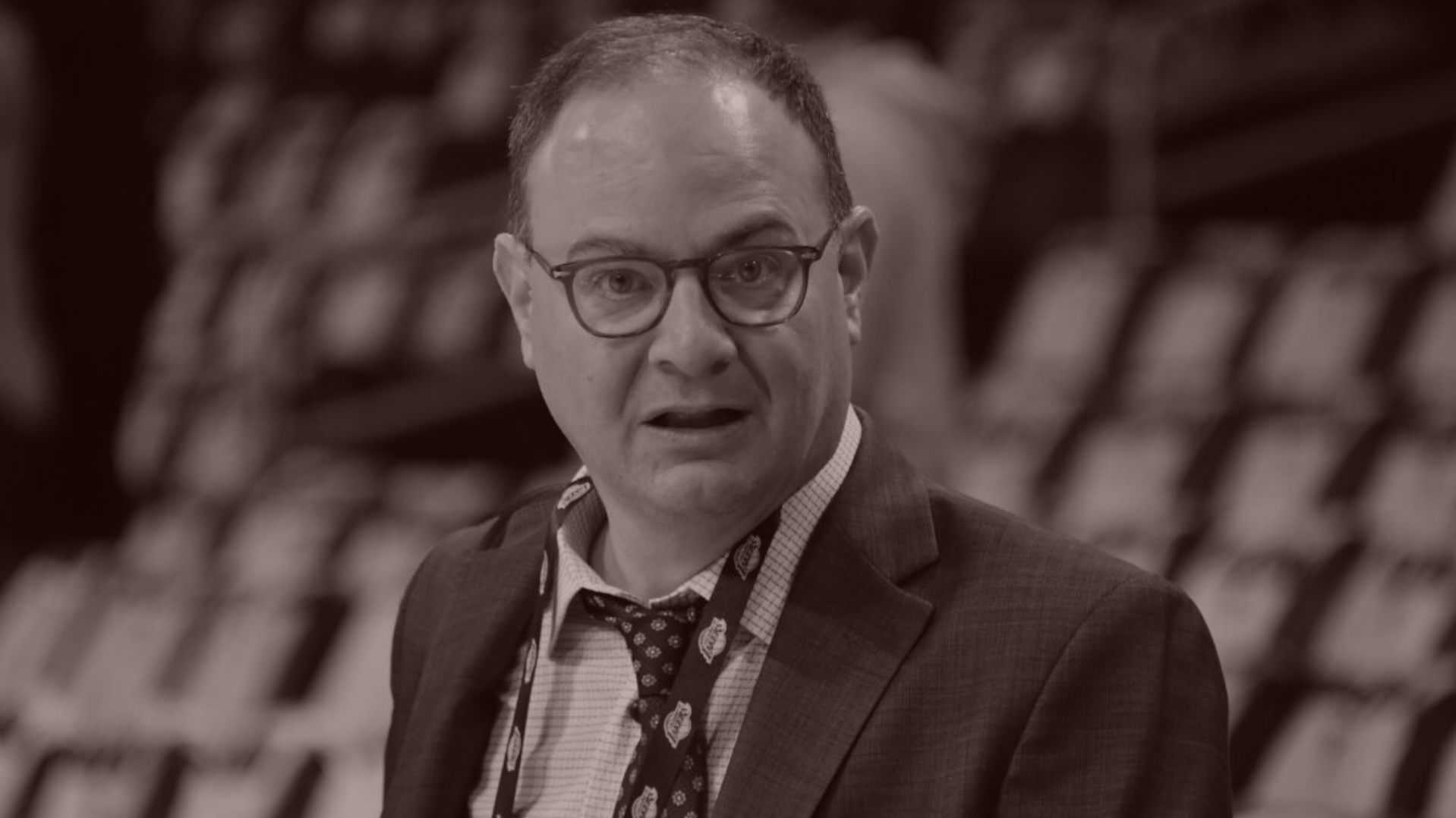 |
 |
|
Greetings from Los Angeles, welcome back to In the Room, and a surprise farewell to Adrian Wojnarowski, a.k.a Woj, ESPN’s legendary NBA insider and trade-window scoop machine who today announced his retirement from the broadcast business and quick-twitch Twitter journalism ahead of contract. Woj was understandably burnt out, but $20 million—yes, $20 million—is a lot to leave on the table. Was there more to it than that? Does his exit set the stage for a Shams ascension? And how much does free agency Twitter scoopage really mean to ESPN’s business, anyway? More on all below the fold.
Mentioned in tonight’s email: Rupert Murdoch, Mathias Döpfner, Jeff Zucker, Jimmy Pitaro, Graydon Carter, Wade Davis, Daniel Alegre, David Muir, Maggie Haberman, Jamie Heller, James Harding, John Wildhack (throwback!), Shams Charania, Fabrizio Romano, and more…
|
|
A MESSAGE FROM OUR SPONSOR
|
 |
The electric SUV that drives like a sports car. Polestar 3. Up to 315 miles of range (EPA). 0-60 in as little as 4.8 seconds. Up to 517 hp. That’s Polestar 3. This electric performance SUV delivers the power and torque of a sports car, and the luxury of a spacious interior. Be among the first to experience Polestar 3.
Schedule your test drive today |
|
|
|
But first…
- Univision C.E.O. defenestration: The board of TelevisaUnivision plans to hold an emergency meeting tomorrow morning at 9 a.m. to vote on a plan to oust Univision chief executive Wade Davis, I’m told. Davis’s impending defenestration, first reported by the Times, comes as Univision has lost ground to its Spanish-language rival Telemundo. Activision Blizzard C.O.O. Daniel Alegre is widely viewed as the top candidate to replace Davis, per sources close to the board.
- Waking up in Reno: Rupert Murdoch has officially embarked on his eleventh-hour effort to rewrite the terms of his irrevocable trust and bequeath favored son Lachlan control of his media empire. The mogul and his brood arrived at probate court in Reno on Monday to begin the closed-to-media trial that will determine whether the elder Murdoch can undo his previous plan, enshrined in his trust, to split control of Fox Corp. and News Corp. among his four eldest children.
It’s not hyperbolic to suggest that this ruling could truly alter the course of American politics. If Murdoch’s bid to preserve Lachlan’s power fails, his more politically moderate children—Prudence, Liz, and James—could conceivably band together to shift the conservative editorial posture of Fox News and the other assets, or sell them. Indeed, Murdoch’s argument rests on the premise that this will happen, and that disagreements between the siblings would hurt the commercial value of the business.
Resist the temptation to draw Succession parallels, since the real story is far more compelling than anything even Jesse Armstrong might have imagined. Here is a 93-year-old titan of industry who conquered the English-speaking world through sheer force of will, bending and warping U.S. and U.K. and Australian politics and culture in the process. (Imagine the current climate without Fox News… I’ll wait.) And now, a genial probate commissioner named Edmund “Joe” Gorman from “the biggest little city in the world,” on the banks of the Truckee River, will decide the fate of the empire. Can’t make this shit up…
- Splitting the Axel: Speaking of media empires, Axel Springer chief Mathias Döpfner is on the cusp of a deal that will give him full control of Springer’s media assets—Politico and Business Insider in the U.S., Bild und Die Welt in Deutschland, and so much in between—while allowing private equity giant KKR to exit the media business and take over Springer’s classifieds business. I’m told that the board will meet tomorrow morning to discuss the deal, which would then be formally announced shortly thereafter. It values the combined company at €13.5 billion, more than €10 billion of which is on the classified side.
Mathias has spent years talking a big game about turning Springer into the leading news organization for the democratic world, with the reach and influence of The New York Times or the BBC. Indeed, he only bought B.I. after failing to acquire the Financial Times, and B.I.’s recent hire of former Wall Street Journal business editor Jamie Heller hints at his desire for greater sophistication across the portfolio.
In any event, establishing a new global media empire is a tall order. This deal will finally empower Mathias to operate a debt-free company with high cash flow (thanks in no small part to Politico), but it’s unclear what the new structure will mean for new investment and M&A opportunities. There’s been speculation that he’d make a play for the Journal—though it’s not at all clear how or where he’d get the financing, and highly implausible that the Murdochs would sell—and it’s also possible he could take another swing at FT. As I reported this summer, some Nikkei board members have grown impatient with FT’s performance and are pushing for consideration of a sale. Axel would be a natural home. We shall see.
- More Fleet Street M&A: The Guardian Media Group is nearing a deal to sell The Observer, the oldest Sunday paper in Britain, to the digital startup Tortoise Media, which was founded by former BBC heavy and Mayfair man about town James Harding. This is a relatively minor deal, of course, but it was also a win-win-win or, perhaps more fairly, a stay of execution. With The Guardian Media Group focusing on global expansion, The Observer found itself facing cuts and even possibly closure—a now perennial condition for print outlets. For its part, Tortoise likely exhausted the financial interest of Matthew Barzun, its lead investor, and needed more capital to scale. Of course, the deal also comes amid broader volatility in the U.K. media market, where Jeff Zucker recently tried and failed to acquire The Telegraph and The Spectator, then sold the latter to Sir Paul Marshall.
What explains all the activity? As one veteran Fleet Street executive put it, most U.K. papers are “in a world of pain,” with owners who can barely afford to withstand the economic headwinds. Meanwhile, “rich people want the influence and access that comes with owning a paper,” and are thus willing to acquire these institutional rags despite the economics. “It takes a brave owner to stick with a structurally declining business alongside iffy digital business economics,” this person said. “There is a fixed cost of running a newsroom, print or digital, and you need a lot of subs paying a decent amount per month or a lot of page views to generate the advertising revenue needed just to break even, let alone generate a profit.” Helluva business, this.
- Air Mail’s Times ad: Graydon Carter’s Air Mail has hired Raine Group to explore a sale of the former Vanity Fair editor’s boutique digital mediaco, per a report in The New York Times. The report includes almost no financials, save for noting that Carter & Co. have so far raised $32 million from a familiar ensemble of TPG and RedBird—as well as a few friendly UHNWIs like David Zaslav—and that it was no longer engaged in sales talks with Standard Investments, another current investor. (Disclosure: TPG and Standard are both investors in Puck, as well.) What’s happening here, of course, is that Graydon is marketing his business in the pages of the Times.
The Air Mail sales process will certainly appear to be a fascinating harbinger for the subscription-first digital-media industry. But the truth is that the company’s most significant long-term value lies in its incipient commerce business. Will someone buy the business with a mind to pivot it toward a Goop for rich older men? The smart guys at Raine are about to find out.
- The Muir conspiracy: In the wake of last week’s ABC News presidential debate, conservative Murdoch-owned outlets Fox News and the New York Post have been pushing a narrative that David Muir’s World News Tonight is taking a ratings hit due to his allegedly biased performance as moderator. (Quick refresher: Muir and his co-moderator, Linsey Davis, took it upon themselves to remind Donald Trump that it’s illegal to execute babies and that his pet-eating conspiracy theories were batshit crazy.) Presumably, Trump allies were expecting them to similarly hit Harris over technicalities about her reformed stance on fracking.
Of course, Trump and his surrogates started blaming the refs the moment they got into the spin room, so the Fox-Post campaign against Muir isn’t terribly surprising. But there’s no real merit to the argument. On Monday, Muir drew his best ratings in five weeks and, as usual, outperformed all competitors across broadcast and cable. Nevertheless, the Post editorial board today published the headline, “ABC debate disaster already punishing ratings, because America’s sick of journo lies.” It’d be a compelling story, if only it were true.
- Finally…: A reminder to fill out this survey for The Puck Private Conversation, an exciting new product we’re spinning up. We want your unvarnished opinion about everything—from who will win the presidential election to how much you spent last quarter on Gucci. (Be honest…) It’s yet another step toward Puck’s goal of bringing you into the conversations that matter in your world.
|
|
And now, on to the main event…
|
 |
| Woj’s Own Woj Bomb |
| It seemed implausible that Adrian Wojnarowski would leave more than $20 million on the table for the prospect of unlimited family time and his sanity—this is television, after all! But the craziest part of this story may be that there is no crazy part, after all. |
|
|
|
| Quite fittingly, Adrian Wojnarowski, a.k.a. Woj, the NBA insider reporter whose very nickname is synonymous with draft and free agency scoopage, saved his final “Woj bomb” for the surprise news about his own transfer. On Wednesday, he announced that he will leave ESPN and retire from journalism to become the general manager of the men’s basketball program at his alma mater, St. Bonaventure—a transition so utterly implausible on its face that the rumor mill instantly cascaded with hypotheses about his impending cancellation or illness. For a few hours, at least, the tireless scoop machine and genre-defining NBA reporter became the subject of the same intrigue he usually afforded others by breaking news of their professional migrations.
The significance of Woj’s own move could be gauged via the reaction in sports and media circles: the feverish texts, the outpouring of praise, the emergency pods. Woj’s ascent to uber-NBA insider at Yahoo! Sports and then ESPN—both under Jimmy Pitaro—tracked with the rise of the niche profession itself, as well as the technology that made distributing such micro-developments possible. In many ways, Woj set the gold standard for breaking news in the Twitter era, the kind of reporter for whom people set push notifications. Comparable reporters in the world of sports include ESPN’s own Adam Schefter for the NFL, as well as Fabrizio Romano for global soccer transfers; and more broadly, Maggie Haberman in the heat of a presidential campaign season, or Barak Ravid amid the roiling Israeli-Palestinian conflict. But Woj, sharp-elbowed and mega-competitive and fully cognizant of the adrenaline-soaked mini-industry that he created, was in his own exalted class.
The job is exhausting, of course, and exhaustion is the stated reason for Woj’s decision to exit now, despite having almost three years left on a $7 million-a-year contract—yes, back-of-the-napkin math suggests he’s leaving around $20 million on the table. Hours after informing Pitaro and network president Burke Magnus of his decision on Wednesday morning, Woj released a statement in which he acknowledged that “the commitment required in my role” was “an investment that I’m no longer driven to make. Time isn’t in endless supply,” he continued, “and I want to spend mine in ways that are more personally meaningful.”
|
|
|
|
|
| In an appearance on ESPN following the news, Schefter made the same point, albeit more vividly: “He wanted his life back. He didn’t want to have to work on holidays. He didn’t want to be away from more family gatherings. He didn’t want to have to take a shower with your phone up against the shower door so you can see a text that’s coming in, or take your phone with you to the urinal and hold it in one hand while you take care of your business in the other. That’s the life that we live.” (Indeed, this is one of the less glamorous aspects of the job).
On some level, it’s hard to countenance that this is as simple as a good Catholic turning down $20 million to return to his alma mater, which hasn’t had any sustained basketball success since 1970. And yet, a thorough survey of ESPN insiders and Woj associates suggests it really is that simple. (And trust me, I tried calling bullshit on these guys.) The job was piling a lot of stress atop the 55-year-old and his family, sources said. Meanwhile, Woj has spent years invested in St. Bonaventure’s basketball program and saw an opportunity to exit on favorable terms, while perhaps preserving an advisory role to ESPN. (Alternatively, some wondered whether he might see this as the first step on a path to the NBA.) And for whatever it’s worth, he joins a proud tradition of ESPN alums going back to their alma maters. John Wildhack, the former ESPN programming chief, retired to Syracuse, where he now serves as director of athletics.
Meanwhile, the most obvious question in the wake of Woj’s exit: Who will replace him? It took all of two seconds for NBA Twitter to start floating Shams Charania, the young NBA insider at The Athletic whose longstanding rivalry with his former mentor was intense enough to warrant its own Wikipedia page. Pat McAfee, never wary of flexing his muscle and testing ESPN executives’ patience, likewise used his own ESPN-licensed show to push Shams as the obvious successor. (Shams is a frequent McAfee guest—a likely poke that Woj probably didn’t love.) Another possible replacement is TNT’s Chris Haynes, who will soon be a free agent and is no doubt eager to jump from Turner now that the network has lost its NBA rights. In any event, ESPN will obviously talk to both Shams and Haynes while also considering internal candidates.
Perhaps the more important question: Does a network facing all the familiar headwinds—the inexorable decline of linear television, increasing competition from deep-pocketed streaming services, the forthcoming launch of its own expensive so-called “flagship” service—really need to be paying anyone high seven figures to break news on Twitter two minutes before everyone else? Free agency Twitter scoopage is meaningful to a reporter’s reputation and personal brand, sure, but it’s not really a business. Woj’s most significant economic value was that his push alerts enticed people with cable subscriptions to tune into ESPN, but his scoopage would be a futile tool to actually attract users to the forthcoming flagship app or ESPN+ or Venu, if that ever happens.
For Woj, a guy who lives his life having to respond to GMs while going hands-free at the urinal or trade texts with agents before dawn, the most surprising element of his timing was that he went out on top. That’s not only aberrant in the history of the television business, but particularly now, as an era just keeps on ending. One wonders if others will follow his lead—realize they’re already rich enough, and that they don’t need the feuds and politics and petty grievances that fuel the business. You’re right… probably not.
|
|
|
|
| FOUR STORIES WE’RE TALKING ABOUT |
 |
| TikTok on Trial |
| An incisive account of TikTok’s rough day in court. |
| ERIQ GARDNER |
|
 |
|
 |
|
 |
|
|
|

|
 |
|
|
|
Need help? Review our FAQs
page or contact
us for assistance. For brand partnerships, email ads@puck.news.
|
|
You received this email because you signed up to receive emails from Puck, or as part of your Puck account associated with . To stop receiving this newsletter and/or manage all your email preferences, click here.
|
|
Puck is published by Heat Media LLC. 227 W 17th St New York, NY 10011.
|
|
|
|










